The Toulouse goose is highly recognizable thanks to its gray color and is popular among poultry owners for various reasons.
This breed is easy to care for and a fantastic multi-purpose bird. The Toulouse goose is renowned for its enormous size and kind and gentle disposition.
If you’re looking for a feathered friend for your family, keep reading!
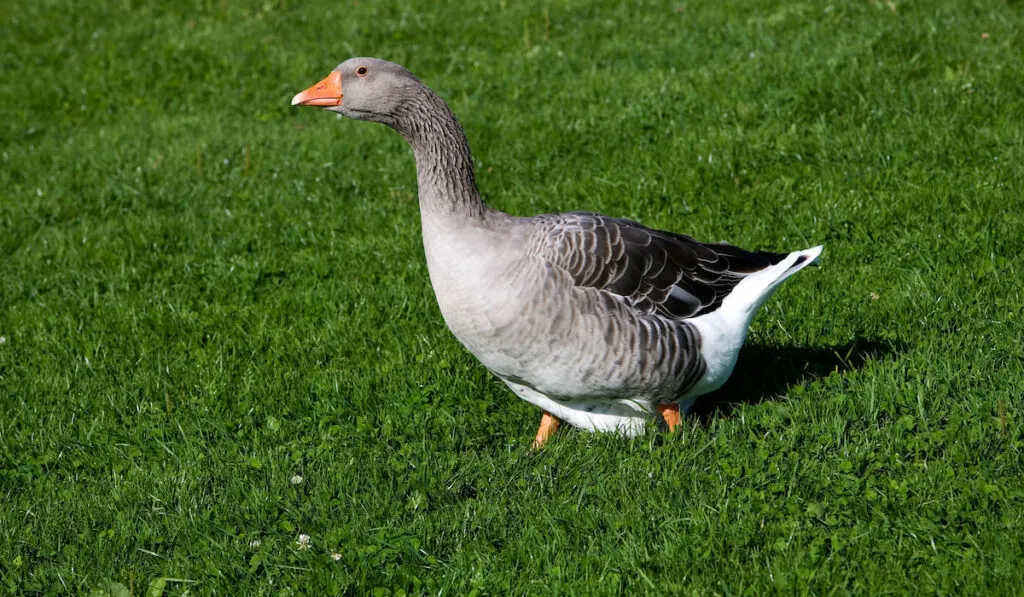
Table of Contents
History and Origin
The Toulouse goose is a domesticated goose breed that originated in Toulouse in southwestern France. This breed came into existence in the 15th century.
This species was mainly raised to produce meat and foie gras (fatty liver). The breed arrived in England in the 1800s and became famous for its meat and eggs.
In the late 1800s, this breed arrived in the United States. Since its arrival, the Toulouse goose has gained popularity among farmers and homesteaders.
Appearance
The Toulouse goose is a large farm goose breed renowned for its tender temperament. It has a spherical, plump body; a large, flat beak; and a medium-length neck.
The breed is known for its gray color, along with its black neck and head. However, some individual birds may have black-and-white body patterns.
The Toulouse goose looks heavy and well-fed, with strong legs and webbed feet.
Characteristics
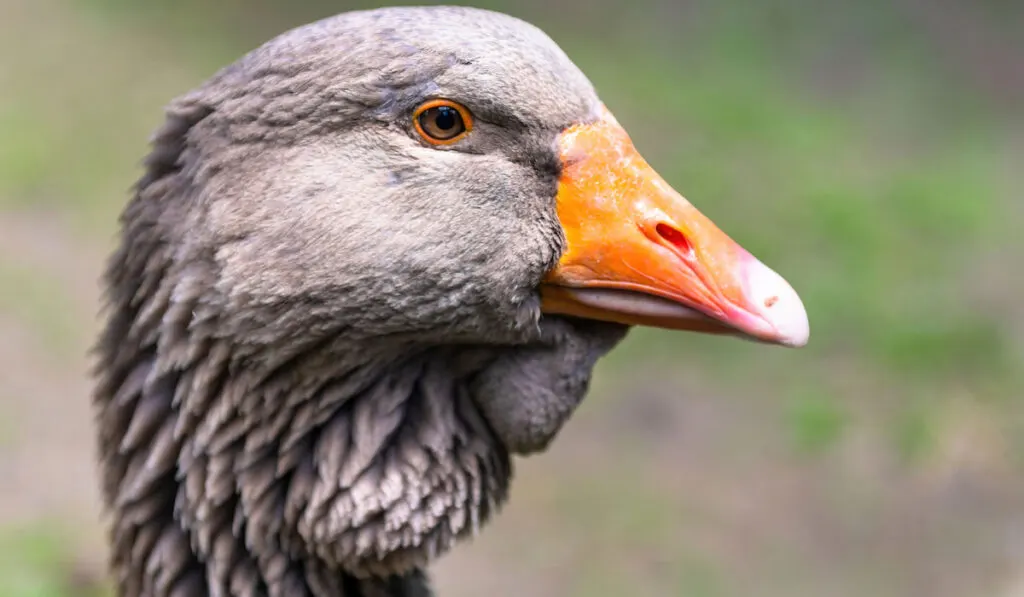
| Name | Toulouse goose |
| Appearance | Brown eyes and gray feathers laced with white |
| Country of origin | France |
| Egg color | White |
| Purpose | Eggs, meat, brooding, exhibition |
| Egg quantity | Average of 35 per season |
| Incubation | 28-34 days |
| Weight | Ganders weigh 26 lbs, while geese weigh 20 lbs |
| Lifespan | 10-12 years |
Dimensions
The Toulouse goose is a sizeable domestic goose breed, one of the largest in the world. They weigh between ten and eighteen pounds.
Color
Toulouse geese have white bodies with black patterns on the neck and head. Additionally, they could have white and black marks on their bodies.

Temperament
These birds are docile, social, clever, and enjoy human interaction.
Toulouse geese are commonly used for backyard flocks, thanks to their overall serenity and laid-back nature.
However, they can become aggressive when defending their territory and goslings.
Egg Laying
Most farmers keep Toulouse geese for their meat. However, they can also produce eggs for consumption.
Toulouse geese can produce twenty to thirty eggs a year on average.
Size
This breed’s eggs are larger and have thicker shells than that of other goose breeds.
Age, diet, and a bird’s genetic makeup can impact the quality and number of its eggs.
Color
Like many other domestic goose breeds, Toulouse geese often lay white eggs.
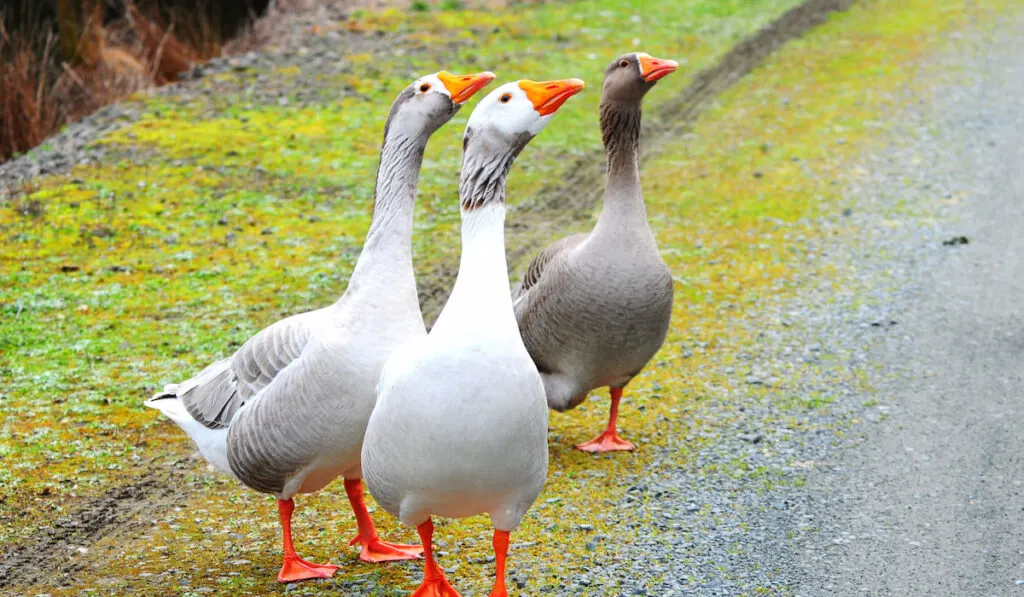
Meat
Toulouse geese are famous for their soft, delicious flesh. They are one of the most sizeable domestic goose breeds, weighing between ten and eighteen pounds.
Their meat is one of the best among goose varieties. The meat quality of geese varies according to age, nutrition, and environment.
Toulouse geese typically take around a year to reach market weight, which is roughly ten to twelve pounds.
After processing, one Toulouse goose generates six to eight pounds of meat.
Thus, they are a good choice for home meat producers and small-scale farmers.
Other Uses
In addition to producing meat and eggs, Toulouse geese can serve other purposes. The most common alternative uses include:
Pets
You can keep them as pets or ornamental birds due to their unique look and gentle disposition.
Pest Control
Toulouse geese can also help control pests on your farm. They consume weeds and insects that could harm your crops.
Feather Products
Their feathers can be used to make pillows, comforters, and other items. They are soft and are good for insulation.
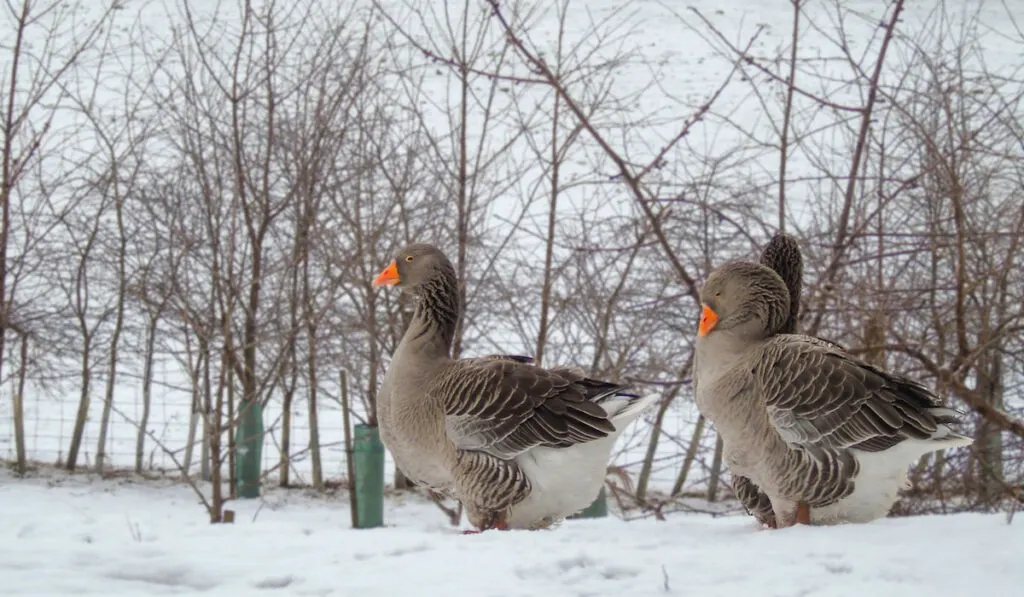
Resistance to Weather
Toulouse geese are hardy and able to survive in cold climates. The birds keep warm by fluffing their feathers and huddling together.
Additionally, these birds have a thick coating of down feathers that helps insulate them from the cold.
However, Toulouse geese require shade and a source of cool water during hot weather.
They are less heat-tolerant than certain other breeds of geese. In hot weather, they could suffer heat stress.
Compared to other breeds, the Toulouse geese struggle to adapt to hot temperatures.
They find it difficult to control their body temperature in scorching conditions.
Therefore, Toulouse geese can benefit from access to a pond or river, as they can use the water to cool themselves.
Rare Colors
Gray is by far the most prevalent color for Toulouse geese. However, you can also find some Toulouse geese displaying other colors.
Pure White
Toulouse geese can be pure white, though this is relatively rare.
Blue
Blue is the breed’s rarest color variant. These geese are distinguishable by their blue-gray feathers.
Saddleback
These Toulouse geese have a striking saddle-like black and white-feather pattern. This color variant is rare.
Remember that most people don’t breed Toulouse geese specifically for their color. Genetic mutations sometimes cause rare color variants to develop.
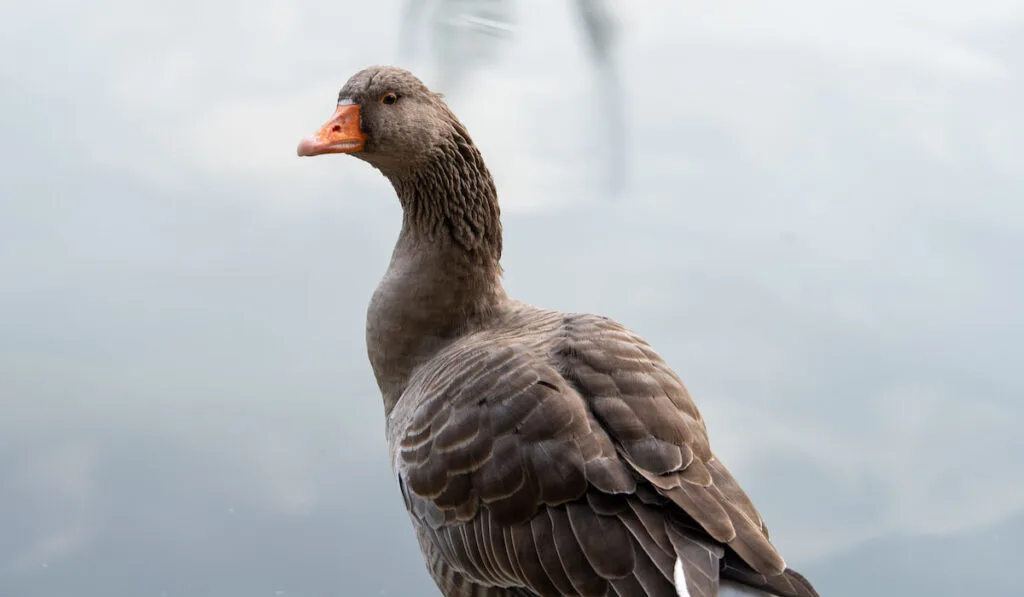
Sexing
You can differentiate male and female Toulouse geese by a few morphological characteristics:
Size
Male Toulouse geese are more heavily built than females.
Head
The top of the male’s head has a sizeable and more noticeable knob.
Vocalization
Males make a honking noise, while females have a more nasal honk.
Behavior
Males may engage in courting behaviors during the breeding season. You can identify them by their hissing, bowing, and neck stretching.
However, these morphological features can vary across individual birds. Thus, they might not always be accurate markers of gender.
For instance, certain birds could exhibit more typical characteristics of the opposite sex.
The Toulouse goose’s behavior during the breeding season is the strongest indicator of the bird’s gender.
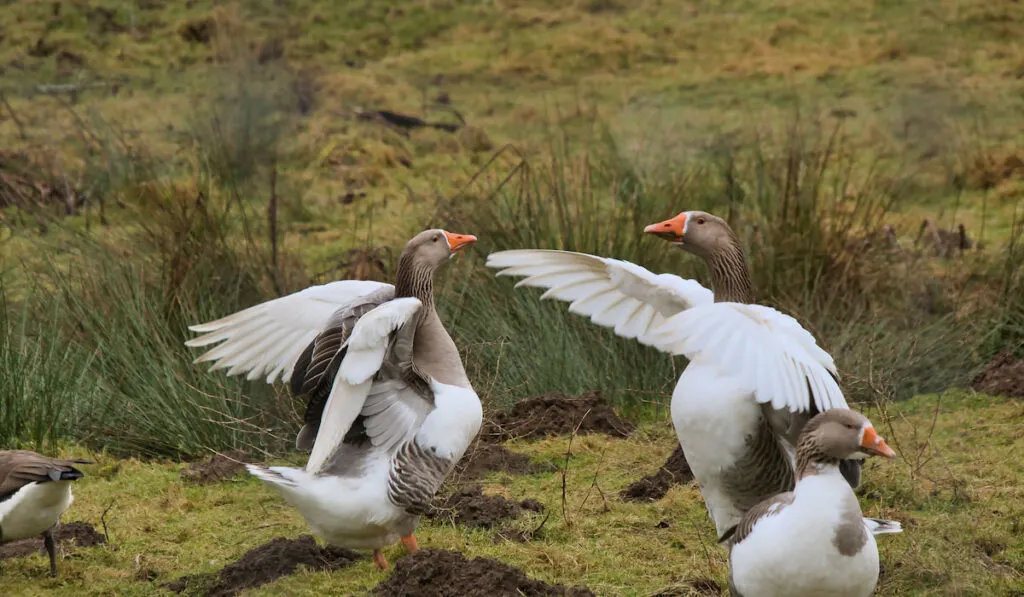
Goslings
Toulouse geese are exceptional parents that successfully hatch and raise their goslings.
Nesting
Toulouse geese will construct a nest and lay their eggs there, if it is in a secure area. Ordinarily, they will only lay one egg a day until they have a full clutch.
The number of eggs per clutch can vary from four to twelve, depending on the goose.
Incubation
The incubation period for Toulouse goose eggs is between 28 and 30 days.
They won’t leave the nest during this period, and they depend on their partner to bring them food and water.
Hatching
The parents will care for and shield the goslings from harm once they have hatched. The goslings will instinctively remain with their parents for protection and food.
Raising
Toulouse geese are skilled at raising their goslings. They will care for them until they are completely grown, giving them food, water, and shelter.
You must create a safe and secure habitat for Toulouse geese to nest and raise their young ones.
Provide them with clean drinking water and nutritious food.
Make sure to keep an eye on their surroundings. Take precautions against predators like foxes, hawks, and other birds of prey.
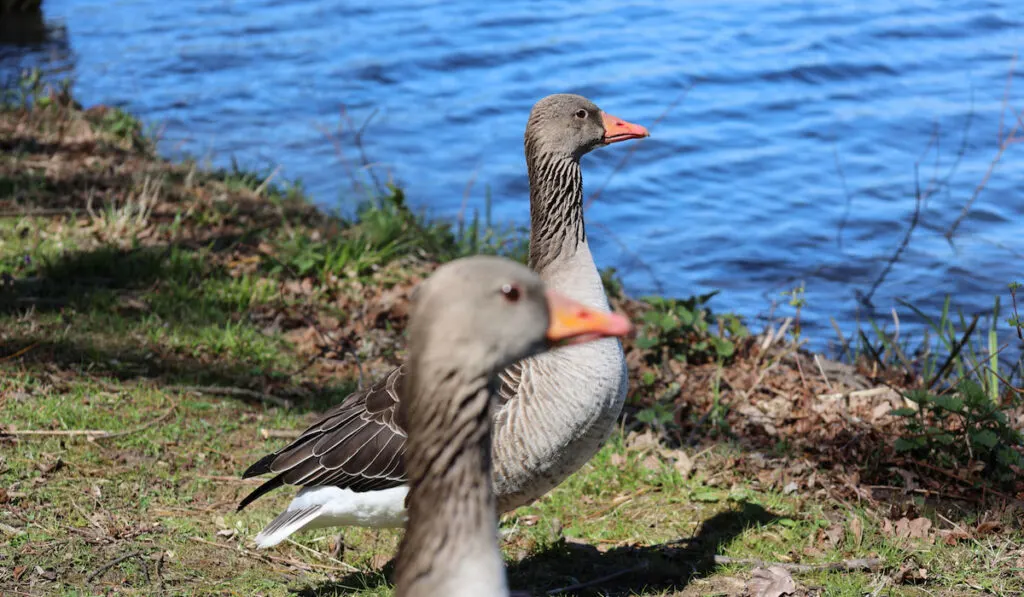
Noise Level
If you are thinking about this bird, keep in mind that Toulouse geese make a lot of noise. The breed is a relatively vocal bird.
They can make a range of honking and hissing noises in the backyard. They are a loud breed, especially during the mating season, when they may also become aggressive.
Furthermore, Toulouse geese may make a lot of noise when threatened or alarmed. The amount of noise they make varies based on their habitat and personality.
Therefore, offer the Toulouse geese a safe and secure habitat to reduce stress levels and minimize noise.
Common Health Issues
Toulouse geese are prone to certain health conditions, much like all poultry birds. They frequently experience the following health conditions:
Parasites
Toulouse geese suffer from internal and external parasites, including mites, lice, and worms. This infestation can result in a variety of health issues.
Respiratory Problems
These birds may suffer from respiratory infections such as avian influenza. You will notice symptoms such as coughing, sneezing, and nasal discharge.
Obesity
Geese are more likely to grow overweight if they lack sufficient space to walk around. They also grow obese when fed an improper diet.
Foot Infections
Toulouse geese can experience foot issues, including bumblefoot, an infection resulting in swelling and discomfort in the foot.
Egg-Laying Problems
Sometimes, this breed may have issues producing eggs.
They can develop egg-laying paralysis, which makes it difficult or impossible for them to lay eggs.
Ensure you provide proper care and a healthy diet to prevent these common health issues.
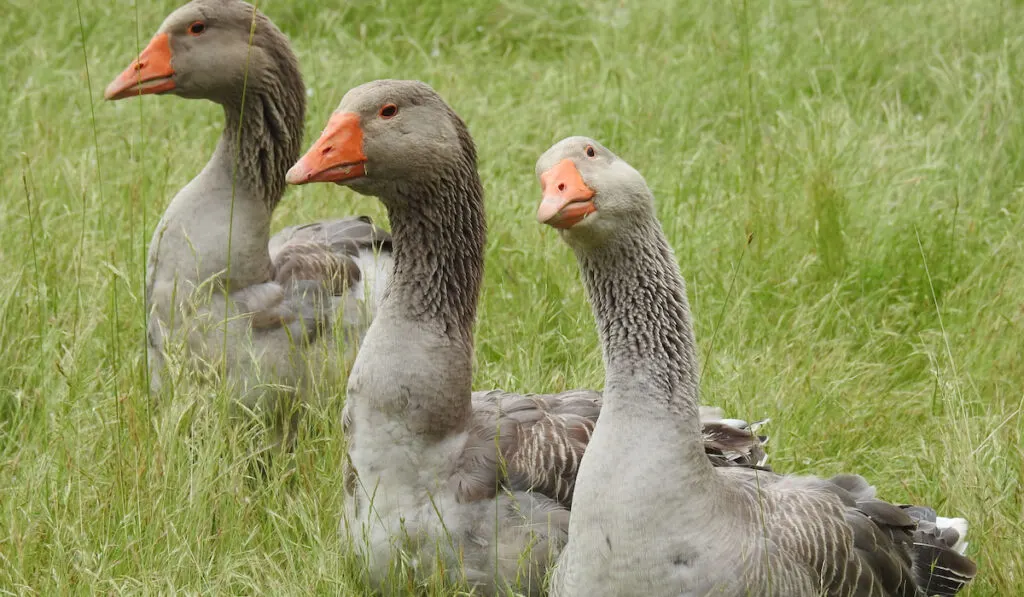
Advantages and Disadvantages
There are several advantages and disadvantages to raising Toulouse geese.
Advantages
- Low Maintenance
Toulouse geese are sturdy, low maintenance, and simple to care for. Therefore, they are an excellent choice if you are a homesteader or small-scale farmer.
- High Meat Yield
Toulouse geese provide a significant quantity of meat suitable for human consumption. Mature birds can weigh up to fifteen pounds, which is great for meat production.
- Good Egg Production
Toulouse geese are intermediate layers; they can lay an average of 35 eggs a year.
- Good Foragers
Toulouse geese are excellent foragers. They can find their food in fields, pastures, and gardens.
Disadvantages
- Slow Growth Rate
Toulouse geese develop slower than other breeds. They take six to eight months to mature and start laying eggs.
- Space
Toulouse geese need a lot of space.
- Aggressive Behavior
Toulouse geese are unsuitable for mixed-species flocks. They will not do well in flocks with aggressive breeds.
- Poor Flyers
Toulouse geese are poor fliers, which makes them vulnerable to predators.

Similar Breeds
Several goose breeds resemble the Toulouse goose in appearance, size, and temperament.
Embden Goose
This large domestic goose breed resembles the Toulouse goose in size and appearance. Many farmers raise them for meat production, due to their rapid growth.
Pomeranian Goose
The Pomeranian Goose is a medium-sized goose breed that resembles the Toulouse goose. They are a popular choice for backyard flocks because of their docile personality.
African Goose
This large domestic geese breed is comparable in size to the Toulouse goose. They are popular as decorative birds because of their distinctive look.
Sebastopol Goose
The Sebastopol is a medium-sized goose breed that resembles the Toulouse goose. People raise them as decorative birds, thanks to their curly feather displays.
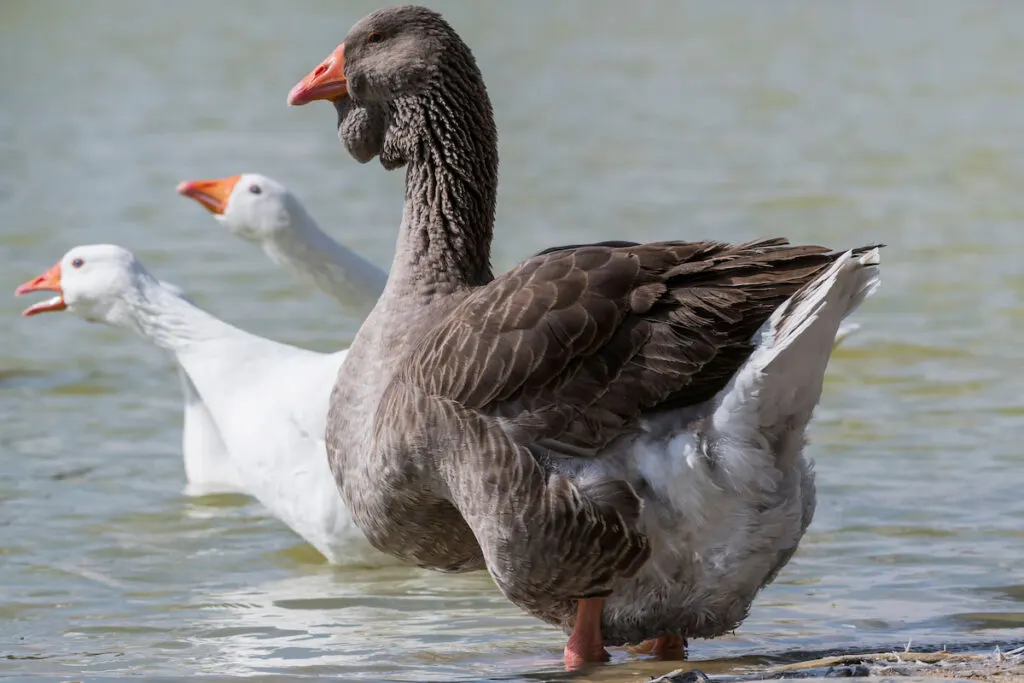
Frequently Asked Questions
This breed does fly, but only for short distances. Though they have powerful flying muscles, they are generally poor flyers.
Yes, Toulouse geese are friendly and gentle birds. This is why they are popular as pets.
Toulouse geese are raucous birds, especially when they are mating or when they sense danger.
You can provide appropriate socialization and training to lessen their noise.
Being omnivores, Toulouse geese consume a wide range of foods, including grass, grains, vegetables, and insects.
Being omnivores, Toulouse geese consume a wide range of foods, including grass, grains, vegetables, and insects.
A Toulouse goose will live for ten to twelve years.
Final Thoughts
The Toulouse goose is one of the heaviest domesticated geese breeds.
It is famous for its resistance to cold weather, calm demeanor, and ability to produce meat and eggs.
Toulouse geese are friendly birds that make excellent family pets. Given proper shelter and care, they are a robust breed that can survive in various climates.
However, the geese may find it challenging to tolerate intense heat.
Our guide will help you understand this special breed, whether you are a beginner or are just looking to add a new variant to your flock.
Resources
I wrote this article from my experience raising geese and the following sources:
- https://www.latimes.com/archives/la-xpm-1988-03-30-fi-253-story.html
- https://livestockconservancy.org/heritage-breeds/heritage-breeds-list/toulouse-goose/
- https://web.archive.org/web/20171104135004/http://www.amerpoultryassn.com/PDF%20Forms/APA
- https://www.dpi.nsw.gov.au/animals-and-livestock/poultry-and-birds/species/geese-raising/breeds-and-breeding
- https://ashtonwaterfowl.net/toulouse_geese.htm
- https://breeds.okstate.edu/poultry/geese/toulouse-geese.html?Forwarded=afs.okstate.edu/breeds/poultry/geese/toulouse/login_form
- https://heritagepoultry.org/blog/toulouse-geese
